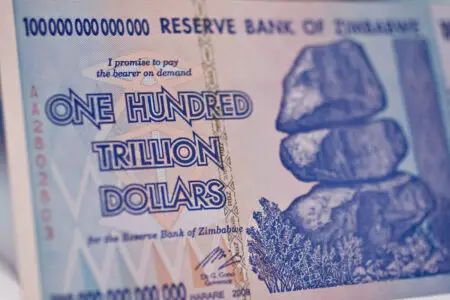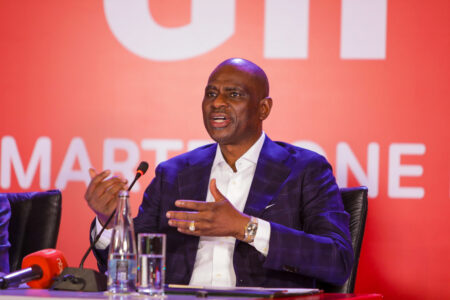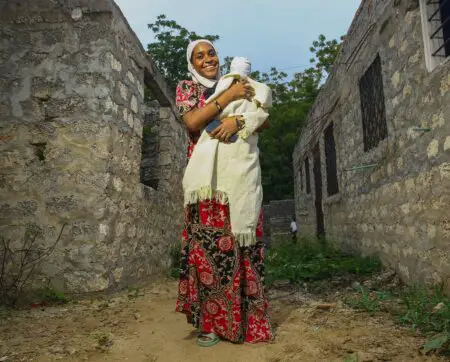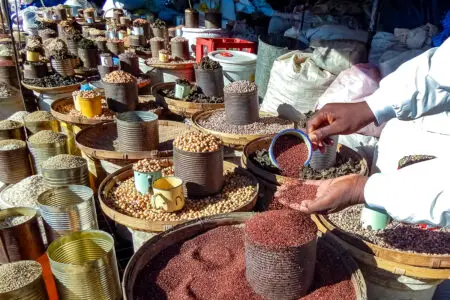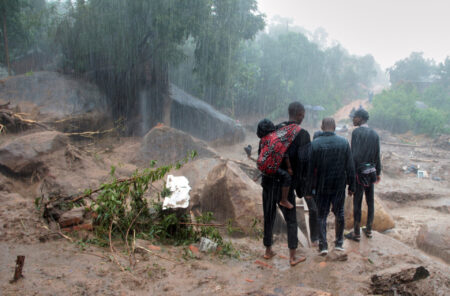- Africa’s new dawn: the rising role of digital and AI in agriculture
- Can Dangote Refinery Transform Africa Energy Ambition
- Gallup Survey: 80 per cent of Kenyan Workers Are Disengaged and Seek New Opportunities
- Madagascar Man Freed from 5KG Tumor After 15-Year Struggle
- How women in Africa are perceived and treated
- Sugar consumption in Kenya to Increase to 1.23 Million Tonnes
- Can Somalia and Turkey Oil deal Bring Change in Somaliland
- Remittances to Kenya dropped to $371.6 million in June, marking a six month low
Browsing: Malawi
- As national debts grow, many African countries find themselves spending more on debt than on health.
- IMF says the debt ratio in Sub-Saharan Africa surged to 60% from 30% of the countries’ GDP between 2013 and December 2022.
- Kenya is for instance using nearly 60% of its annual revenues on paying debt obligations.
As the Africa debt crisis roils, over half of the countries have found themselves spending more money in servicing their loan obligations than even the amount they have budgeted for health services to their citizens.
This unfolding scenario is further burdening millions of their citizens who have little choice but to shoulder heavy tax burdens to settle mountains of debt.
Prof Danny Bradlow, a Senior Research Fellow at the Centre for the Advancement of Scholarship in Pretoria, South Africa, captures the dire situation, stating: “over the last three years (2019/22), more than 25 African governments allocated …
- Zimbabwe is the worst hit in Africa with food inflation at 26% YoY, followed closely by Egypt at 18%, Malawi at 9%, and Guinea at 7%.
- The persistent weakness of the Zimbabwe dollar has been a driving force behind the steep price growth throughout 2023.
- Real food inflation, calculated as the difference between food inflation and overall inflation, provides a dire picture of the strain on households’ budgets in these countries.
The economies of Zimbabwe, Egypt, and Guinea are facing significant challenges due to soaring food inflation, placing them among the top 10 countries globally most affected by this roiling crisis.
According to the World Bank’s February 2024 update, Zimbabwe leads the pack in Africa, with food inflation at a staggering 26 per cent year-on-year, followed closely by Egypt at 18 per cent and Guinea at 7 per cent.
Real food inflation, calculated as the difference between food inflation …
- Airtel Africa CEO Olusegun Ogunsanya has retired and will be replaced by Sunil Taldar, the new Managing Director and CEO.
- For the six months ending on September 30, the group reported a net loss of $13 million,
- Mittal further announced Ogunsanya’s post-retirement role as the Airtel Africa Charitable Foundation Chair.
Airtel Africa CEO set to retire
Airtel Africa PLC has announced that Chief Executive Officer Olusegun Ogunsanya will retire on 1 July 2024 and take an advisory role.
Ogunsanya, who joined Airtel in 2012, ran the Nigeria Operations of the Telecommunications and Mobile Money Company for nine years before he was appointed Chief Executive Officer of the Group in 2021.
He led the company to maintain double-digit revenue growth and deliver new products to its customers across the continent.
Building on the work undertaken during his time as CEO, including the launch of the Company’s first Sustainability Strategy, and given …
- They will also receive comprehensive mentorship and coaching as part of a 12-month accelerator program.
- This year’s focus was on female-owned enterprises pioneering Fourth Industrial Revolution (4IR) technologies such as artificial intelligence, big data analytics, virtual reality, robotics, IoT among others.
- The winning ventures, led by women from across Africa, focus on sectors affected by climate change.
African enterprises have triumphed in the 2023 YouthAdapt challenge, with eight dynamic women-led businesses securing victory. Each of these enterprises is set to receive grant funding of up to $100,000.
They will also receive a comprehensive mentorship and coaching as part of a 12-month accelerator program. Since its launch in 2021, the YouthADAPT initiative has provided more than $5 million to 33 young entrepreneurs from 19 African nations.
Jointly organised by the African Development Bank Group (AfDB) and the Global Center on Adaptation, supported by the Africa Climate Change Fund, YouthADAPT is …
- Kenya’s Bluewave Insurance Agency has announced plans to raise $6 million to expand into five new African markets to increase insurance penetration in markets characterized by low uptake.
- Company Founder and CEO Adelaide Odhiambo says the investment would be raised over the next three years.
- The insurer is partnering with Mobile Network Operators and banks to distribute affordable micro-insurance products, with plans to enter Uganda, Nigeria, Ethiopia, Malawi, DRC, Tanzania, Rwanda, and Zambia.
Kenya’s Bluewave Insurance Agency has announced plans to raise $6 million as the firm seeks to expand into five new African markets, aiming to increase insurance penetration in regions characterized by low uptake. Adelaide Odhiambo, Founder and CEO of Bluewave Insurance Agency, stated that the investment would be raised over the next three years to support the expansion plans.
Bluewave Insurance Agency’s new target markets
The company has forged partnerships with large aggregators, specifically Mobile Network Operators …
The Vodafone Foundation has set aside $6 million to extend the successful m-mama maternal health initiative to Malawi over the next five years. This expansion aims to enhance maternal and newborn healthcare access in Malawi and the region. Malawi has one of the highest maternal mortality rates in the world. Estimates show that the country currently records 5.7 maternal deaths per 1,000 live births.…
- Commodity exchanges are organized marketplaces that facilitate the trading of agricultural commodities such as grains, livestock, and even precious metals.
- These exchanges provide a structured environment for buyers and sellers to come together and exchange commodities based on standardized contracts.
- In Southern Africa, these exchanges have taken on a transformative role in empowering farmers and bolstering the agricultural sector.
Southern Africa’s agriculture is marked by its rich diversity of crops and products. According to International Fund for Agriculture (IFAD), agriculture is the largest sector in the East and Southern Africa region, employing 65 per cent of Africa’s labour force and accounting for over 30 per cent of the region’s GDP.
But it’s not without its hurdles. Smallholder farmers, who constitute a substantial portion of the agricultural workforce, often grapple with unpredictable market prices. They also suffer from limited access to credit, and inadequate information on market trends.
Additionally, the …
- Price of staples goes up 300 percent compared to the same time last year.
- UNICEF estimates more than 4.8 million children are in dire humanitarian need.
- Over 500 000 people displaced
The social and economic impact of tropical cyclone Freddy on Malawi continues to worsen as inflation kicks in on all staple foods.
While recovery efforts are ongoing, Malawi is now under high pressure to stabilize food prices. It is now over ten days since the South-Eastern African country was hit by what is considered the worst-known tropical cycle to ever occur anywhere in the world.
“Very intense Tropical Cyclone Freddy was an exceptionally long-lived, powerful, and deadly storm that traversed the southern Indian Ocean for more than five weeks in February and March 2023. Freddy is both the longest-lasting and highest-ACE-producing tropical cyclone ever recorded worldwide,” reports the World Food Programme (WFP).
The report cites 1,078mm of rain fell …
- EU insists it has not put sanctions on food and fertilizers from Russia
- Malawi receives the first consignment of 20,000 tonnes of Russian fertilizers
- The EU, UN might consider releasing more fertilizers and food embargoed at European ports to Africa
The EU insists that food and fertilizer are not part of the sanctions it has imposed on Russia due to the ongoing conflict with Ukraine, yet the global supply of much-needed fertilizer is in short supply which begs the question; is Russia hoarding fertiliser supplies?
While the EU says it is not to blame, Russia says it is the Western sanctions that are causing the decrease in fertilizer exports. It only makes sense that Russia would hold back fertilizers to increase its own domestic food production in the face of future uncertainties in the still very volatile situation.
The sanctions on other sectors of Russia’s economy are spiralling to the …
Medical marijuana may very well be the agri-business that Africa needs to get its economies high in the global multi-billion agro-industry.
Already, Africa’s marijuana production is on the rise.
According to the Oklahoma Medical Marijuana Authority (OMMA) medical marijuana dispensary sales totalled US$11.5 million in just under one month. Other than the sales, OMMA also says in that same time, between January and February of 2019, it also raised more than US$3 million in taxes alone.
The following month, approximately US$873,361 came from the 7% gross receipts tax and US$1.3 from the 4.5% state sales tax.
Since OMMA began accepting applications for medical marijuana licensing, the state says it has pocketed well over US$7.1 million inpatient license fees and more than US$11 million in revenue generated in commercial license fees.
That is just one state. Consider how much the entire US has made from medical marijuana as a country. Worldwide, …






